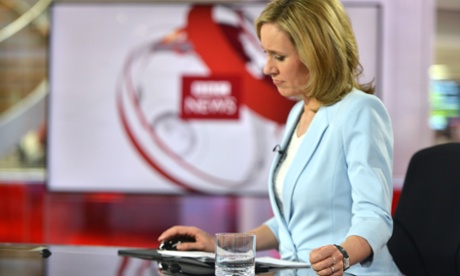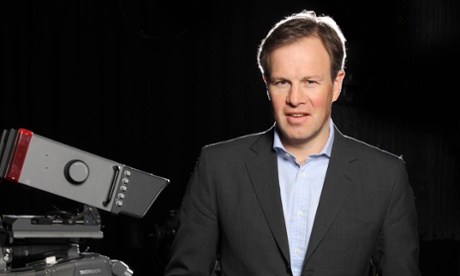
As negotiations and recriminations continue over whether viewers will see a TV debate between David Cameron and Ed Miliband, one political head-to-head is available nightly – the duel between the 10pm news bulletins on the UK’s oldest channels. So, as the rival newsrooms prepare for the election campaign, I watched both – or, as politicians might say, conducted a comparative study of – Thursday night’s BBC1 and ITV News at Ten.
Thursday night anchors Mark Austin and Mary Nightingale at the ITN desk and Sophie Raworth alone in the BBC studio had the same lead story – the terrorist attack on the museum in Tunis – with identical UK-based spin: the killing in the incident of a British tourist. Each had also got a journalistic big gun there in time to report live: Rageh Omaar for ITV and Fergal Keane for the BBC.
Omaar employed the standard sombre tones and vocabulary of tragedy reporting – “the peace of a Tunisian museum shattered by gunfire” – but his rival showed why the term “fergal keaning” is now used by some to refer to the sound of Irish lamentation. “Today the fearful aftermath,” Keane noted, of “the new age of international terrorism”. He made priests at gravesides sound cheerful in comparison.
ITV used two bits of Omaar to “doughnut”, as the jargon has it, a London-made package about the methods of Islamic State terrorists. The BBC wrapped two chunks of Keane around an interview with a local man who claimed to have known one of the gunmen and observed his turn towards extremism.
As a viewer, I wondered how the crew in Tunis could be completely certain that a stranger found so rapidly and speaking in translation phrases of a generalised kind –the guy used to “drink and gamble” with them before being “radicalised” – really had known the terrorist well. But presumably the BBC’s news managers were happy with the guarantees given [see footnote].
After that, on the day after the budget, there was inevitably a Westminster head-to-head, with both programmes exploring doubts about where George Osborne was going to find the £12bn cuts he had outlined in his speech.
Direct comparisons are tricky here because the BBC’s political editor, Nick Robinson, was unavailable as he was recovering from surgery. So, on this occasion, ITV political editor Tom Bradby was up against BBC economics editor Robert Peston. Bradby fielded a graphic about the differing five-year plans of the three main parties, a sceptical economist and a joke about Osborne’s fondness for photo ops involving hi-vis jackets and hard hats. Peston, hands and new fringe flapping as he sat at a cafe table, had the same gag and a similar doubtful pundit but his piece also included artily filmed footage of a descent on a seaside big dipper in order to illustrate an expert’s metaphor about the British economy being on a “roller coaster.”

Such metaphorical flourishes – visually lavish but often simplistic in content – have become a BBC news signature, whereas you feel that, if the prime minister happens to mention Game of Thrones, ITN will still think hard before despatching Brady to a fancy dress shop to choose a costume to wear outside the House of Commons.
That is an example of how the tonal differences between the two “Tens” are sometimes unexpected. The usual view is that the BBC version tends to be more analytical and internationalist, while ITV is more popular and jolly. But, in practice, this vision of the two sides jousting with rolled-up copies of the Guardian and the Daily Mail is complicated by some surprising moves.
This was confirmed by the Thursday editions. ITN included a sports jolly – images of new England football call-up Harry Kane during a childhood meeting with David Beckham – that the BBC ignored. But they did nothing with Charles and Camilla meeting Obama, on which the theoretically more upmarket BBC bulletin went big.
Fairly typically, though, the BBC sought to give this monarchist fodder a journalistic spin, interleaving scenes from the Oval Office with the progress of the Guardian’s legal campaign to force the release of letters to government ministers from the Prince of Wales. .
But, although generally attempting more context, the BBC1 news also felt in some ways more populist than its ITN equivalent. While ITN correspondents deliver their reports fairly straight, the BBC’s aim more for operatic notes of tragedy (Keane) and comedy (Peston). The reporter as performer, which you might more logically expect from ITV, is more likely to be found on the other side.
The only theatrical intonation that Austin employed last night was, perhaps revealingly, when going into the ad break. With a pleading intonation, he listed the stories coming up “after the very short break”. Does research show that some ITV viewers are not returning after the adverts, or – even worse – switching over to the BBC?
If they did so on Thursday night, they would have encountered another increasingly familiar aspect of the BBC news brand. A report that appeared to be an impressive exclusive – on a gang smuggling illegal immigrants out of the UK so that they can come back in as asylum seekers – proved to be a trail for a documentary immediately following the news. Like some movie trailers, the best bits had been filleted so efficiently that there seemed little point in watching the full documentary. Even the subsequent preview of today’s partial eclipse (another item shared with ITV) included a plug for “a BBC Stargazing special” on the subject.
Unless they flick between them, few viewers will ever watch both bulletins on the same night. But, for those who do, the BBC-ITV rivalry is very similar to the Conservative-Labour one – large areas of overlap, but with intriguing differences that sometimes go against expectation.
• This footnote was added on 23 March 2015. Fergal Keane has asked us to point out that the interviewee was found using “old fashioned journalistic common sense”. The crew found out where the funeral wake for one of the gunmen was taking place, but complied with a request from the family not to film. Two of the men attending the funeral then came over to speak with them. Both had known the dead man and one was willing to be interviewed.







